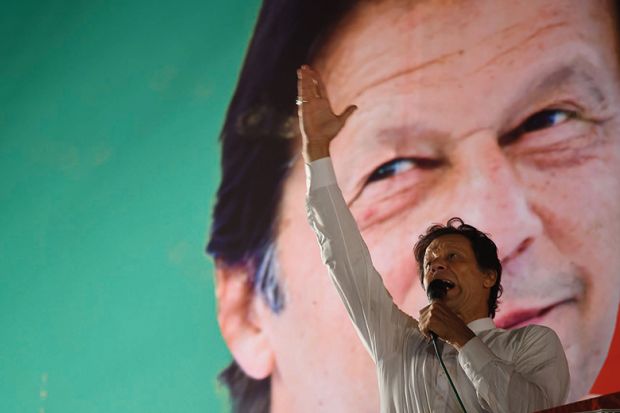Imran Khan’s rise to power has bolstered optimism that Pakistan will finally confront corruption and improve quality in its university sector, but hopes that the nation will become a global higher education player in the near future are regarded as overambitious.
As Times Higher Education went to press, Mr Khan, chairman of the Pakistan Tehreek-e-Insaf party, was due to be installed as prime minister within days. Although Mr Khan, a former international cricket star who was chancellor of the University of Bradford from 2005 to 2014, saw his centrist party fall short of an outright majority, it won the most votes and was set to form a coalition.
In its election manifesto, the party said that it would make Pakistan’s Higher Education Commission fully autonomous, “make universities autonomous by delinking them from the government”, and “remove political influence” by creating an “independent, transparent mechanism to select vice-chancellors and senior administrators”.
It also promised to “upgrade existing” technical universities and “establish at least 10 technical universities” by “engaging world-class institutions as partners”; set up a National Endowment Fund for international universities; and provide international distance learning opportunities for tertiary education.
The party also hopes to create partnerships with international universities to improve teaching and research quality, as opposed to research volume.
Although Pakistan is the world’s fifth most populous country, it lags behind neighbouring India and China on higher education development; it has just one institution, Islamabad’s Quaid-i-azam University, in the top 500 of the latest THE World University Rankings.
Abdur Rehman Cheema, an academic based in Islamabad, said that “the mood is very positive” in Pakistan in light of the election.
He said that the introduction of merit-based recruitment of teachers in Khyber Pakhtunkhwa, where the Pakistan Tehreek-e-Insaf party has ruled for the past five years, improved the quality of public educational institutions in the province and he “trust[s] this will happen at the federal level as well” with merit-based recruitment of university vice-chancellors.
“Ultimately, this will lead to improvements in the HE sector of Pakistan,” he said.
However, Dr Cheema questioned whether the addition of 10 technical universities would have a great impact, stating that there has already been a “rapid increase in new universities” and that the government should instead focus on strengthening quality in existing institutions.
He added that he was “not that hopeful that higher education will take precedence” over improving primary education given that 22 million children remain out of school in the country.
Mehvish Riaz, an assistant professor at the University of Engineering and Technology Lahore, welcomed plans to establish more technical universities and said that Mr Khan has the “tenacity, potential and willpower to materialise the proposed reforms”.
However, she said that progress would be slow given that Pakistan’s external debt is $91.8 billion (£70 billion) and it will take time for foreign partners to come on board.
Faisal Abbas, experienced research fellow in economics at the University of Göttingen, said that international collaboration with renowned universities in Europe, North America and Australia was “a step taken” during Pervez Musharraf’s leadership from 2001 to 2008, but “political instability” and the influence of the Taliban in parts of the country proved to be stumbling blocks.
Even if the new government is able to establish 10 universities with international partners, there is a “big question mark” over whether it will “be in a position to bring in highly talented diaspora and internationally known researchers and scholars to these institutions”, he said.
Pervez Hoodbhoy, Zohra and ZZ Ahmed Foundation distinguished professor in mathematics and physics at Lahore's Forman Christian College, said: “Higher education develops in certain cultural situations only, where truth and honesty in academia are valued. Pakistan has been unable to develop a university culture over its 70 years of existence because violators of academic ethics, morality and basic notions of justice go scot-free.”
Regarding Mr Khan’s plan to remove political influence from the process of appointing vice-chancellors, he questioned whether this could be “operationalised”, claiming that “there are so few academics of distinction in any field in Pakistan and there is no mechanism for determining quality”.
POSTSCRIPT:
Print headline: Will Khan bring progress to Pakistani universities?
Register to continue
Why register?
- Registration is free and only takes a moment
- Once registered, you can read 3 articles a month
- Sign up for our newsletter
Subscribe
Or subscribe for unlimited access to:
- Unlimited access to news, views, insights & reviews
- Digital editions
- Digital access to THE’s university and college rankings analysis
Already registered or a current subscriber? Login







